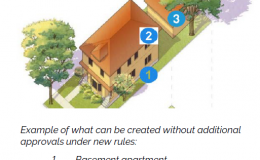GTA real estate sales hit record high in February
The Toronto Real Estate Board says there were 7,621 sales in February, up from 6,294, an increase of 21.1 per cent.

DARREN CALABRESE / CP
The Toronto Real Estate Board says that 2015 was a record sales year for its members, with 101,299 sales through TREB realtors through the year.
If you’re in the market for a single-family detached teardown complete with a gas stove, large manicured backyard and hardwood floors, Toronto may be the real estate market for you.
Though it’s listed at $1.075 million, an ad for the Etobicoke bungalow currently on the market touts its premium lot and proximity to even more expensive, multimillion-dollar homes. Ideal for a family as is, but equally appealing for a developer, suggests the listing.
A conditional offer is on the table.
Single-detached homes are becoming a luxury item, especially for first-time buyers, say some analysts, as Toronto posted a record month for overall housing sales in February, according to the Toronto Real Estate Board.
“Sales are off the charts,” said John Pasalis, a Toronto real estate broker with Realosophy. “The market is insanely competitive.”
Buyers have been lining up 10 and 20 deep this winter to bid on a limited supply of their desired homes, he said.
David Fleming has worked in Toronto real estate for 12 years. What he’s seen so far this year is unprecedented, he said, calling January the “toughest market I’ve ever worked in for single-family homes.”
Toronto MLS average price, 2015 and 2016
JANUARY 1, 2015 $552,575
JANUARY 1, 2016 $631,092
FEBRUARY 1, 2015 $596,163
FEBRUARY 1, 2016 $685,278
“Every single house that comes out, even those that aren’t really worth it, end up with multiple offers,” he said. “So it’s a very difficult time to be a buyer and the good times continue to roll for the sellers.”
That’s with the average price of a detached home in Toronto coming in at $1,211,459 in February, according to TREB, up 16.3 per cent since this time last year.
Overall, Toronto real estate is booming, with a record number of transactions last month, up 21.1 per cent compared with February 2015.
Although supply ticked up in Toronto, with new listings rising 8.2 per cent, Fleming said the demand is insatiable.
“There just aren’t enough people willing to move,” Fleming said.
“People aren’t selling to rent, people aren’t selling to move out of the city, people aren’t selling to move overseas as much as might be necessitate to facilitate the overall demand,” he added.
But with home prices in Toronto averaging $685,278, who is buying?
“The positive thing is it’s actually home buyers rather than speculators or flippers,” Pasalis said.
In York Region, where the average home price is the highest in the GTA, at $859,589, realtor Ferro Payman with Remax Infinite is making a quarter of his deals with foreign buyers who are benefiting from the low Canadian dollar.
Working primarily in Richmond Hill, Vaughan and Woodbridge, his Chinese, Iranian and Saudi clients mainly deal in U.S. dollars.
“In their mind, they’re willing to spend $1 million, but when they convert the money and have it sitting in the bank, at this point they have $1.2 or $1.3 million,” he said.
His foreign buyers include recent immigrants as well as non-residents purchasing homes for their children in Canada on temporary visas.
“They see the growth of Canada, especially in Toronto. And when I show them the sales that have been happening over the past couple of years, they become very eager to purchase a house,” Payman said.
“We didn’t think it would be a game changer, and certainly the stats for February suggest that there was, at least in the initial stage, no impact whatsoever,” said Robert Hogue, a senior economist with RBC.
In a recently released study of affordability, RBC found Toronto and Vancouver are outliers, with the rest of Canada escaping the buying bonanza.
Though given the recent numbers, Hogue concedes the hot markets aren’t burning out.
“We may say what we want about affordability, but it doesn’t look like it is a big restraint for buyers at this point,” Hogue said.
“There’s no hard-and-fast rule for what’s affordable and what’s not affordable,” he said. “We only realize after a market crash or correction how unaffordable things had become.”
The current situation could be vulnerable to a shock given levels of household debt, he said.
“If something happened to the GTA economy that would cause the unemployment rate to surge, then the market would become vulnerable to a correction.”
He cites a reasonably strong economy, robust job growth, and Ontario’s appeal to international and interprovincial migrants for stocking the real estate market with buyers.
He conceded that detached houses, especially in Toronto and Vancouver, are becoming a luxury.
“The more realistic ownership option for the average buyer, but especially for first-time buyers, is condominium apartments,” he said.
Despite the competition, Fleming maintains the dream houses exist, citing pockets of semi-detached family homes in Toronto’s east side.
“There’s a lot of homes out there, the difficulty is when you have 20 offers on a property, 19 people go home disappointed,” he said. “In terms of finding the house it’s not really difficult. It’s buying the house that’s difficult.”




